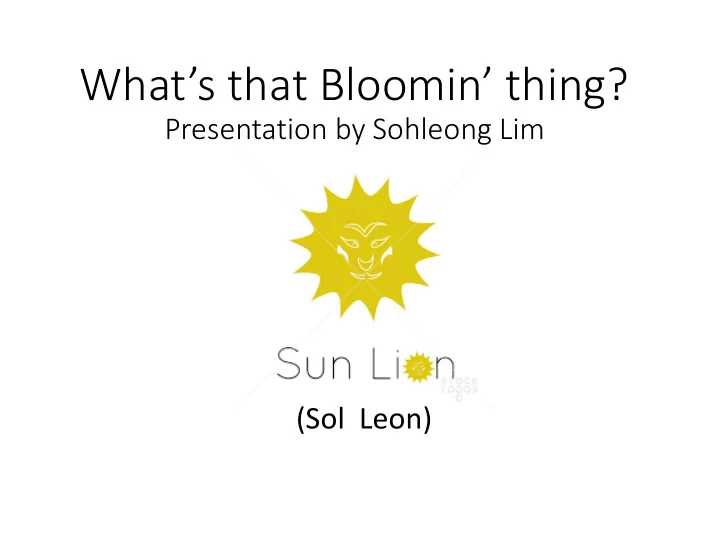

What’s that Bloomin’ thing? Presentation by Sohleong Lim (Sol Leon)
So what is THIS bloomin’ thing?
Tecoma capensis (Cape honeysuckle) Family: Bignoniaceae (big-no-nih-AY-see-ee) Genus: Tecoma (tek-OH-muh) Tecoma stans (Yellow bells) Yellow trumpetbush • Trumpet flower • Esperanza •
Map of Tecoma capensis http://www.discoverlife.org/mp/20m?kind=Tecoma+capensis
Map of Tecoma stans http://www.discoverlife.org/mp/20q?search=Tecoma+stans
Positive On Jul 2, 2011, faithiep from Oldsmar, FL (Zone 10b) wrote: Love love love this plant… in clearwater fl. True, it is a little wild and will require pruning and watching. But if you're going for the tropical look, all your plants are pretty much like that...I think it should probably be the main specimen in a planting, not a supporting cast member. Negative On Jun 11, 2012, luvsandeigo from LA JOLLA, CA wrote: I hate this plant and would do ANYTHING to avoid it. It is invasive, aggressive and almost impossible to kill. Spreading 15' or more into the surrounding territory. It's a nightmare. It's NOT the plant you want to use unless you have a lot of time to dig and cut to control it. TOO much work. I put this plant next to Bamboo and Horsetails .... a nightmare.
Form: Vase-shaped shrub or small tree capable of reaching 20 feet tall.
- Excellent plant for wildlife garden • - Popular with sunbirds and • hummingbirds due to its nectar
Tecoma stans or Yellow Bells This plant is attractive to bees, butterflies and birds
Poison honey ??? "Yellow bells is poisonous, yet bees are attracted to it. The bees are not killed by it, but the honey that comes from it IS poisonous.” http://www.botanical-journeys-plant-guides.com/yellow-elder.html http://patwelsh.com/wpmu/blog/garden-q-a/is-cape-honeysuckle-tecoma-capensis-toxic /
Xenophon (401 BC ) in Anabasis “… but the swarms of bees in the neighborhood were numerous, and the soldiers who ate of the honey all went of their heads, and suffered from vomiting and diarrhea, and not one of them could stand up, but those who had eaten a little were like people exceedingly drunk, while those who had eaten a great deal seemed like crazy, or even, in some cases, dying men. So they lay there in great numbers as though the army had suffered a defeat, and great despondency prevailed. On the next day, however, no one had died, and at approximately the same hour as they had eaten the honey they began to come to their senses; and on the third or fourth day they got up, as if from a drugging” http://www.ncbi.nlm.nih.gov/pmc/articles/PMC3404272/
Recommend
More recommend